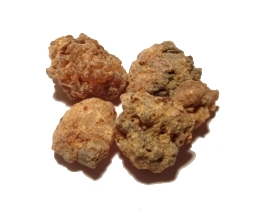
Commiphora myrrha is a spiny desert shrub. Myrrh is extracted as a resin from the trunk of this desert shrub. It is found beneficial in reducing gum inflammations, sore throats and tonsillar infections. It is also a good supplement for heart, blood and hair, also a great antibacterial.
Benefits of Myrrh: Anemia, alleviates blood impurities, biliousness, catarrh, arthritis, asthma, bronchitis, pharyngitis, ulcers, cough, indigestion, hair loss, broken bones, increases WBC, mouth inflammation, traumatic injuries, gargle for spongy gums, menstrual disorders.
Habitat: Indigenous to North-East Africa.
Action: Alterative, cholesterolaemic, anti-inflammatory, expectorant, emmenagogue, antithrombotic, analgesic, antibacterial/fungal, leucocytogenic.
Scientific name: Commiphora myrrha.
Useful part: Resin.
Dosage: 3–12g per day dried resin.
Energetics
Rasa (taste): Bitter, astringent,pungent, sweet
Vırya(energy): Cooling
Vipaka (post-digestive effect): Pungent
Guna (quality): Heavy, dry
Dosa effect: KV-P+
Dhatu(tissue): All tissues
Srotas (channel): Circulatory,lymphatic, nervous, reproductive, respiratory
Classical and common names
Ayurvedic: Bola, Hiraabola, Surasa, Barbara, Gandharasa.
English: Myrrh, Bdellium gum.
Constituents: Resin-Triterpenes, commiphoric acid, commiphorinic acid, commiferin. Gum-Arabinose, galactose. Volatile oil-Sesquiterpenes, heerabolene, dipentene, cinnamic aldehyde.
Preparation: Infusion, powder, pill, paste